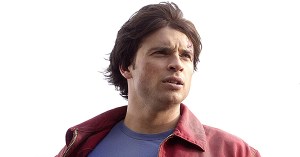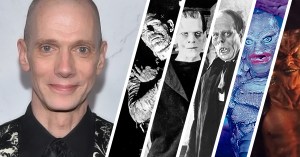Total Recall: Matthew Broderick’s Best Movies
We count down the best-reviewed work of the Tower Heist star.
Most of the fuss surrounding this weekend’s Tower Heist has to do with Brett Ratner, Eddie Murphy, and/or Ben Stiller, and we totally get that — but for our money, the real reason to get excited about the ensemble comedy is that it boasts a supporting turn from the ever-reliable Matthew Broderick. We don’t see Broderick on the big screen as often as we used to, but he spent the 1980s as one of Hollywood’s busiest leading men, displaying a knack for arch comedy as well as sensitive drama. To celebrate his latest role, we decided to take a fond look back at some of the many critical highlights from Broderick’s filmography, and found a few surprises — as well as plenty of classic hits. It’s time for Total Recall!
10. Mrs. Parker and the Vicious Circle
Dorothy Parker and her Algonquin Round Table have long been a subject of fascination for historians and literary scholars, but their story doesn’t have an obvious cinematic slant — which is why producer Robert Altman and writer-director Alan Rudolph had to struggle for years to get Mrs. Parker and the Vicious Circle off the ground, even after getting Jennifer Jason Leigh to star for a greatly reduced salary. In the end, Leigh led a rock-solid ensemble cast (including Matthew Broderick as Parker’s onetime paramour, playwright Charles MacArthur) to enthusiastic reviews — and if audiences didn’t respond, it was their loss, according to critics like the San Francisco Chronicle’s Mick LaSalle, who enthused, “What a wonderful, detailed portrait. And what an evocation of a time and a mood. Mrs. Parker and the Vicious Circle is truly one of those films that inhabits its own world.”
9. Project X
Broderick reunited with WarGames writer Lawrence Lasker for 1987’s Project X, a socially conscious, politically themed drama about a smart-aleck test pilot who, as punishment for his misdeeds, finds himself tasked with supervising a chimp project — and discovers his subjects are being exposed to lethal levels of radiation. His character’s subsequent efforts to save the chimps form the basis of the type of noble, heartwarming tale that filmmakers tend to smother with schmaltz, but director Jonathan Kaplan was careful not to layer the film with false sentiment. As Rita Kempley observed for the Washington Post, “It’s as unabashedly political as Silkwood and unashamedly sentimental as Lassie Come Home. Yet it remains taut and resists the temptation to paint the villains too broadly.”
8. Biloxi Blues
Broderick earned one of his first big breaks with the role of Eugene Morris in Neil Simon’s Broadway play Brighton Beach Memoirs, and he returned to the character when Simon’s sequel, Biloxi Blues, arrived on the stage two years later — so it was only natural that when Mike Nichols decided to turn Biloxi into a film, Broderick would play Morris once more. The result brought few surprises, either for Simon fans or for anyone who’d ever seen a coming-of-age story, but most critics felt it transcended its formulaic trappings with a sweetly funny script and a pair of winning performances from Broderick and Christopher Walken. “Perhaps this movie isn’t as wise or as profound as Simon wants it to be,” admitted the Chicago Reader’s Jonathan Rosenbaum, “but it is certainly a cut above sitcom complacency, and packed with wit and charm.”
7. Ferris Bueller’s Day Off
Given its status as a towering classic of 1980s cinema, it’s somewhat surprising that Ferris Bueller’s Day Off only has an 84 percent on the Tomatometer — but hey, we don’t write the reviews, we just compile ’em. Its spot on this list might be lower than you’d expect, but no matter what, Ferris contains some of Broderick’s most beloved work, and he’ll probably always be best known for his performance as the cheerfully irresponsible teenage folk hero. “Whether you’re coming to this happy-go-lucky comedy with fresh eyes or through a miasma of nostalgia,” wrote Netflix’s James Rocchi, “there’s something here for everyone to enjoy.”
6. The Lion King
Broderick wasn’t at the mic for The Lion King‘s early scenes, when Home Improvement star Jonathan Taylor Thomas played the voice of Simba, and he didn’t handle the songs, which were sung by former Toto vocalist Joseph Williams. But still: he was Simba, the Lion King, and that’s pretty darn impressive. Entertainment Weekly’s Owen Gleiberman called it when he predicted, “The Lion King, more than any of the recent wave of Disney animated features, has the resonance to stand not just as a terrific cartoon but as an emotionally pungent movie.”
5. Election
By the late 1990s, Broderick’s career had weathered a string of high-profile disappointments, including The Road to Wellville and Addicted to Love; until the decidedly rotten Godzilla broke $300 million, his biggest success of the decade came through his voice work as Simba in The Lion King. But in 1999, things turned around with Alexander Payne’s Election, an ink-black political satire that follows the war between an annoying overachiever high school student (Reese Witherspoon) and the miserable history teacher (Broderick) who makes it his mission to keep her from the student body presidency. “Surprise!” gasped TV Guide’s Maitland McDonagh, calling it “An intelligent, well-written high school story that offers some real ideas to chew on, rather than simply wallowing in nubile flesh.”
4. Glory
Broderick is such a skilled cinematic nebbish that the idea of him playing a Civil War colonel might have seemed ludicrous, but he — and his elite cast of co-stars, including Morgan Freeman, Andre Braugher, and the Oscar-winning Denzel Washington — shouldered the burden of Glory‘s weighty, fact-based story admirably. Aided by historian Shelby Foote, director Edward Zwick brought filmgoers to the front lines with the first all-black unit in the United States Army, telling their story with sensitivity and grace. Critics responded with almost universal praise — including James Berardinelli of ReelViews, who enthused, “Glory is, without question, one of the best movies ever made about the American Civil War.”
3. The Freshman
In 1990, Matthew Broderick was 28, and probably had no business playing a first-year college student who winds up working as an errand boy for a reputed mobster (Marlon Brando) — but that’s just about the only thing wrong with The Freshman, which uses Broderick’s stuttering charm as a sounding board for one of Brando’s finest late-period performances. Riffing on his work in The Godfather, Brando looks like he’s having even more fun than he had cashing that big check he got for two weeks of work on Superman, and it’s contagious; as Joe Brown wrote for the Washington Post, “Writer-director Andrew Bergman gets away with nearly every goofy gag he goes for, and he’s successful largely because his actors never betray that their giddy universe isn’t absolutely real.”
2. You Can Count On Me
During the early part of his career, Broderick was called upon to play a lot of mild-mannered nice guys, but as he approached middle age, casting directors discovered he was also a good fit for squirrelly, unpleasant men — a gift he displayed in 1999’s Election, and then again the following year in Kenneth Lonergan’s Sundance favorite You Can Count on Me. As a philandering bank manager who steps out on his pregnant wife to hook up with an employee (Laura Linney), Broderick took a supporting character that could have been a blustery cartoon villain and imbued him with tragic, mealy-mouthed desperation, giving the Boston Globe’s Ty Burr one more reason to call the film “satisfying in every respect” and “a piece of blue-collar chamber music, never treating the characters cheaply, allowing them a complex entwinement of emotions.”
1. WarGames
The movie that forever changed the meaning of the phrase “how about a nice game of chess,” WarGames tried to capitalize on the early 1980s video game craze by spinning a far-fetched yarn about a teen hacker (Broderick) who worms his way into a NORAD computer and, thinking he’s playing a cool new game before it hits stores, ends up nearly triggering World War III. It’s the kind of bleep-and-bloop-assisted high-stakes drama that Hollywood’s been messing up since computers were invented, but in this case, it works — partly because the drama was amplified by our very real Cold War paranoia, and partly because of a terrific cast that also included Ally Sheedy, Dabney Coleman, and a young (but still quite crusty) Barry Corbin. Observed Roger Ebert, “As a premise for a thriller, this is a masterstroke.”
In case you were wondering, here are Broderick’s top 10 movies according RT users’ scores:
1. Glory — 92%
2. The Lion King — 89%
3. Ferris Bueller’s Day Off — 89%
4. Torch Song Trilogy — 89%
5. You Can Count On Me — 87%
6. Thief and the Cobbler — 73%
7. Election — 72%
8. Ladyhawke — 72%
9. WarGames — 69%
10. The Producers — 63%
Take a look through Broderick’s complete filmography, as well as the rest of our Total Recall archives. And don’t forget to check out the reviews for Tower Heist.






